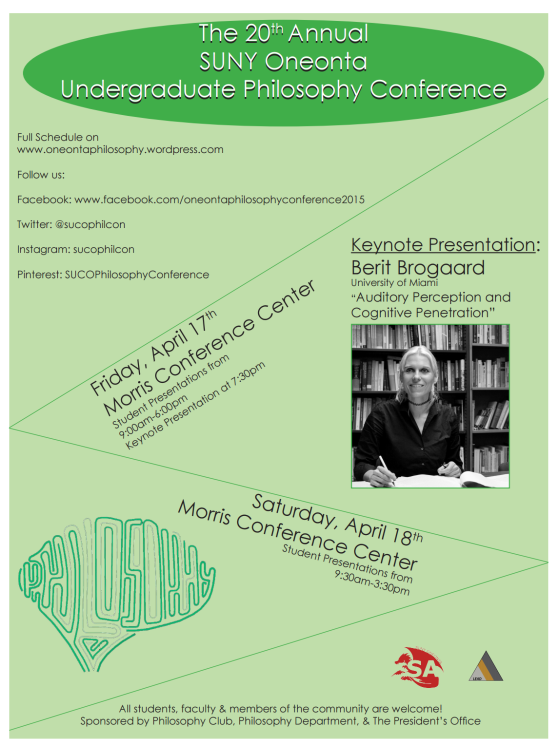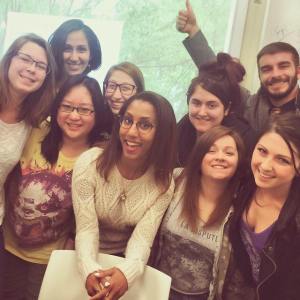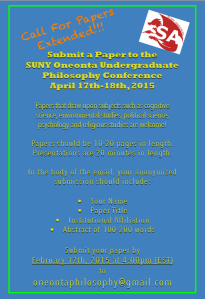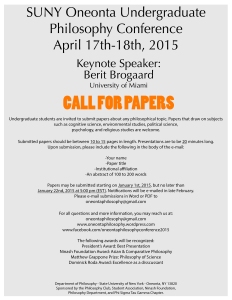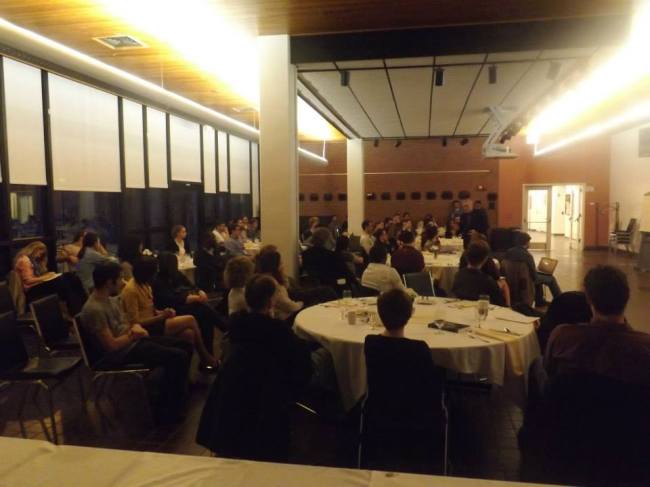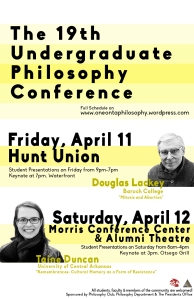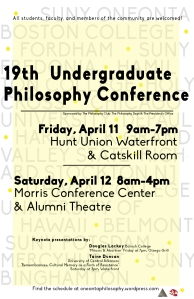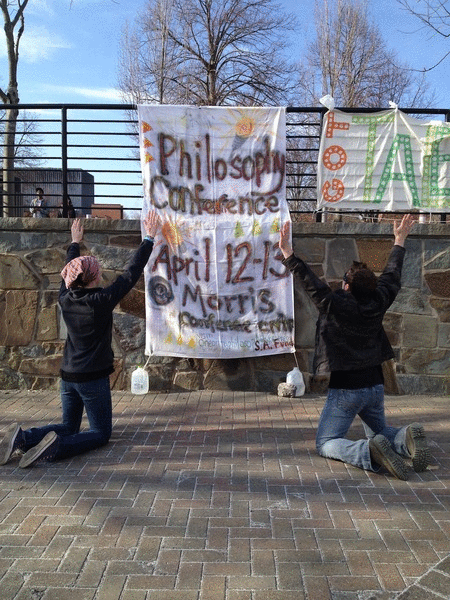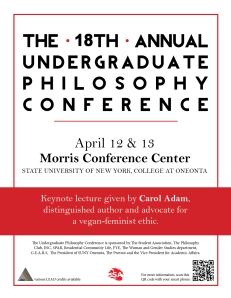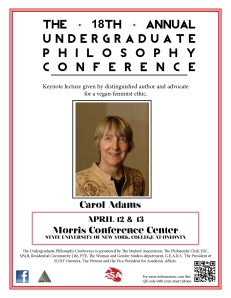Join us!
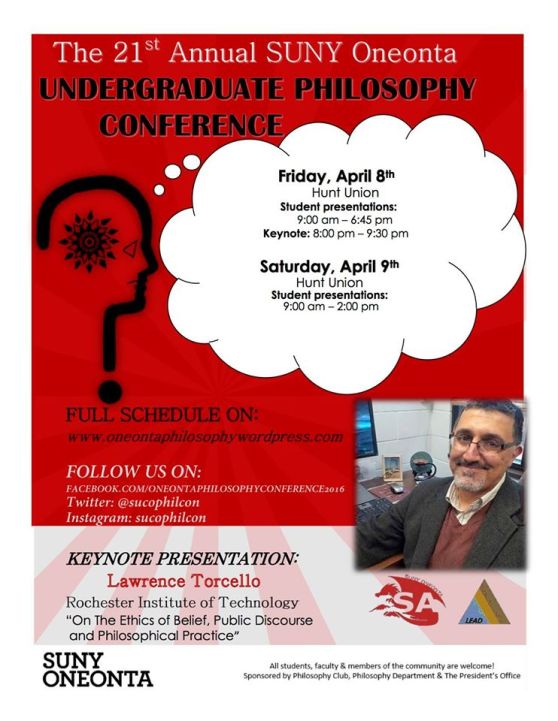
2016 Papers & Abstracts
Abstracts and Discussants:
If you wish to be a discussant for one of the papers that you see below please e-mail and contact Michelle Nelson, Discussant Boss, at nelsm38@suny.oneonta.edu with requested paper.
On The Ethics of Belief, Public Discourse, and Philosophical Practice
Keynote Presentation: Dr. Lawrence Torcello
Rochester Institute of Technology
The notion that there may be an “ethics of belief” comes from a 19th-century paper written by British philosopher and mathematician W.K. Clifford. In that paper Clifford argues that we are morally responsible for our beliefs because each belief that we form creates the cognitive circumstances for related beliefs to follow, and we inevitably influence each other through those beliefs. Recent cognitive research supports Clifford’s insights regarding patterns of belief formation and social influence. The confirmation offered by such research suggests that informational accuracy holds serious ethical significance in public discourse. I will use the example of climate change and political discourse on climate change to illustrate the point. Moreover, although scientific and epistemological matters are not always thought to be linked to normative morality, I build on Clifford’s initial insights to argue that such linkage is fundamental to inquiry itself, and that the practice of philosophy entails related moral commitments.
Donor Conception and the Value of Family History
Presenter: Laura Bearden
University of Hawaii
This paper examines the morality of current donor conception practice. In particular, it engages with David Velleman’s argument that donor conception practice is morally problematic, because the practice creates children with the intention that they will never know one or more of their biological parents. According to Velleman, knowing one’s biological parents is an essential aspect of the conception and formation of one’s identity, but donor conception practices deprive products of donor conception of this aspect. I argue that it is not clear that donor conception practice must be morally problematic for the reasons to which Velleman’s argument appeals.
Discussant: Mathew DiStadio
Finding Closure – A Response to Dretske’s Criticism of the Justification Closure Principle in the Skeptical Argument
Presenter: Lucas Bennett
University of Toronto
In this paper, I criticize Fred Dretske’s famous attack against the Justification Closure Principle (JCP) as applied to the skeptical argument. According to Dretske, JCP is false since it treats justification as a fully penetrating epistemic operator, his main argument being that an epistemic operator that operates on p may fail to penetrate to some presuppositions of p. After presenting his counterexample to JCP, I argue that Drestke’s argument fails since he makes an unwarranted assumption that, for any justification J, if J warrants a person S to believe that p, then that same J must warrant S to believe that q, given that p entails q. I also introduce the ideas of actualized justification, modal justification, and antecedent satisfaction as an explanation of Dretske’s error in denying justification as a fully penetrating operator.
Discussant: Bethany Wise
“The Thinking Animal Argument” and Contingent Identity
Presenter: Alex Coombs
SUNY Potsdam
This paper will be dealing with the account of Animalism that is offered by Eric T. Olson in his paper “An Argument for Animalism” and will be broken up into five parts. The first of the sections I will give an overview of Olson’s thought on animalism and the implications of his view if his account of animalism is correct. In the second section the aim is to present and explain Olson’s “The Thinking Animal Argument”. The third part of the paper will give a brief overview of the concepts of necessary identity and contingent identity. The fourth part of the paper will deal with explaining Allan Gibbard’s ideas and argument for the possibility of contingent identity. The final part will concern applying Gibbard’s ideas of contingent identity to Olson’s “The Thinking Animal Argument” in an attempt to demonstrate that Olson’s account of animalism does not work logically and as a consequence his argument does not support his conclusions of animalism.
Discussant: Morgan Rugiro
Self-Care as a Burdened Virtue
Presenter: Kirsten Donato
Albany College of Pharmacy and Health Sciences
In her book, Burdened Virtues: Virtue Ethics for Liberatory Struggles, Lisa Tessman defines “burdened virtues” as those traits that help one obtain human flourishing but also detract and negatively impact the well-being of one’s self which inevitably leads to great pain and suffering in the individual. A burdened virtue both inhibits and contributes to human flourishing, especially for members of oppressed groups. Whereas, self-care, I will define as a combination of self-awareness of current health status and place in the world along with the ability to take action to promote one’s wellbeing through this awareness. Throughout this paper, I will reference and acknowledge the mentally ill as an oppressed group. I will use the narrative of a schizophrenic patient from a popular book, The Quiet Room by Lori Schiller, to help understand why self-care is a virtue and specifically, a burdened one, currently absent within the population. I will explore the questions: What is the nature of the virtue of self-care? And what would it look like to practice self-care? Why is the virtue of self-care needed in the mentally ill population?
Discussant: Nicole Cavicchio
Is Empathy Necessary for Morality?
Presenter: Lily Dragon
Lewis and Clark University
Empathy plays a central role in our daily lives. Empathy makes is possible for us to experience perspectives other than our own. It is the ability to understand the concept of other minds, as well as to experience other’s emotions vicariously. Through this experience, the concerns of other’s become meaningful to ourselves and we are alerted when moral events are taking place. This experience is unique to empathy and may stimulate moral judgment and motivation. This is most often true with those who we consider near and dear. The partiality of empathy proposes a challenge to the traditional definition of morality, suggesting that we may have to expand this definition. In this paper, I explain the role empathy plays in our moral deliberations and motivations. First, I propose a working definition of empathy. Second, I explain Jesse Prinz’s argument that empathy is not necessary for morality. Third, I suggest some possible responses to Prinz’s argument. Finally, I suggest some further avenues for investigating the role of empathy in morality.
Discussant: Zachary Johnson
Pros and Cons of Lewis’s Counterfactual Analysis
Presenter: Katie Ebersole
SUNY Potsdam
In David Lewis’s paper “Causation,” he seeks to use counterfactual analyses to prove true cause from false in certain cases of causation, trying to make it as close to use of the term ‘cause’ in our language as he can. In this paper I will lay out his basic thesis and the problems he hopes to solve with counterfactual analysis. I will then discuss a critique of his account by David-Hillel Ruben, addressing Lewis’s implications of necessity and sufficiency. His primary concern is that sufficiency is not captured by his counterfactual analysis of causal dependence. I will then discuss the nature of his critique before continuing on to a further defense of Lewis. Stig Alstrup Rasmussen did just so shortly after Ruben published his critique. He has since revised his defense on behest of others who noted errors in his derivation, and I will lay out his revised defense as well as his ultimate concessions to Ruben, and the proposals that Lewis could adopt to alter his position. This having been done, I will proceed with my own account as to the relevance of Ruben’s work as well as the effectiveness of Rasmussen’s defense.
Discussant: Aaron Suduiko
Concerning Knowledge and Human Understanding
Presenter: Charlie Feher-Peiker
Hartwick College
Considering the great variety of beliefs, opinions and notions generated by and based on rational thought and introspective considerations of natural occurrences, it is impossible that such subjective experience could produce any full and complete knowledge of what Emanuel Kant calls the “Transcendent.” This being the case, I posit in this paper that human beings can in fact, never know anything in any robust sense, i.e. in any absolute, unchanging sense. Besides the most basic and rudimentary of necessarily understood concepts, humans cannot know anything more than what is imperative to stave off what I call “psychic paralysis.” To show how it is that human beings can only have a functional, rudimentary knowledge of the world, I will begin by examining the nature of knowledge and consider the difference between what Jean-Paul Sartre calls, objects “in the world” and the way in which Kant says we project our understanding of the world, onto the world. From this distinction and the vast disparity also between the conclusions drawn from subjective experiences, I conclude that it is impossible for any individual consciousness to ever draw any meaningful conclusions about the world, as it necessarily exists, utilizing purely empirical methods.
Discussant: Dylan Verner-Crist
Polity: Aristotle’s Idea of the Best Practical Constitution
Presenter: Christopher Friere
The Macaulay Honors College at CUNY Hunter
Aristotle’s idea of the best achievable constitution of a state has been debated by scholars for over a millennium, and a generally agreed upon answer remains to be offered. Many academics claimed this constitution to be a democracy, believing it to accord most fully with human nature and to empower the masses. Others asserted this constitution to be an aristocracy, supposing it enables the virtuous to rule and ensures just legislation. I defend an alternative interpretation – that Aristotle understands the best practical constitution to be a polity, which I argue is comparatively most achievable and more directly associated with his understanding of the best life. Through a critical examination of Books III, IV, V, and VII of Politics, I will explore how polities coincide with the best life by fostering just rule and sociopolitical stability. In doing so, I aim to clarify the shortcomings of democracies and aristocracies in comparison to polities as a practical regime according to Aristotle’s own beliefs.
Discussant: Griffith Eddy
Primal Goals of Progress
Presenter: Christine Garcia
SUNY Oneonta
The melting of the anthropological doctrines of primitivism and progressivism has been found greatly within esoteric, metaphysical, mystical, occult philosophies in order to create a fuller and more effective mentality so as to benefit humankind. The two doctrines speak of seemingly opposite mindsets, but are really the complementary extensions of one another. This has been done through various movements of philosophical thought, including the Theosophical Movement of the nineteenth century, and the New Age Movement of the twentieth century. Upon studying these two movements in particular, one can clearly see their roots in conventional primitivist ideology, through their reverence of ancient occult and mystical knowledge of past peoples. The New Age Movement, as research demonstrates, is an extension of the Theosophical Movement in practices, principles, and influences. Nonetheless, through picking up the reigns where theosophy left off, the New Age Movement with its philosophical practices has become a collectively progressivist movement with the goal of inspiring conscious living habits for humans on this planet. In all the various branches of the New Age Movement, superseding the constraints of duality is highlighted. Marriage between seemingly opposing forces is one of the many philosophical foundations which keep the Movement alive and expanding. This paper demonstrates how the New Age Movement in particular has become the means by which the merging of primitivism and progressivism can be applied efficiently in the present day.
Discussant: Frank Pomes
Oppression and the Significance of Moral Creativity
Presenter: Priscilla Hall
Albany College of Pharmacy and Health Sciences
In Burdened Virtues, Lisa Tessman claimed that if individuals are to resist oppression, they must demonstrate integrity. Integrity – a unity of one’s inner morality and outer identity – is expressed through dedication and overall moral goodness. However, for those whose lives are defined and limited by oppression, integrity alone may not be sufficient for successful resistance. In assuming integrity’s importance, a critical virtue relationship may be overlooked: while integrity is essential for acting out individual goals, creativity is necessary for the personal discovery and creation of those goals. While virtue ethics focuses primarily on the moral self; creativity grants individuals the ability to observe, assess, and select the proper actions of the moral self, thus connecting creativity to the center of projects in virtue. This leads to the central question of my paper: if an individual suffers significant moral damage as a direct result of oppression that restricts her moral creativity, can she still internally construct a future moral identity that is capable of resistance? I will argue that oppression’s damage to moral creativity is equally threatening as damage to moral integrity, as the two must exist simultaneously for an oppressed individual to flourish and develop successful strategies of resistance.
Discussant: Alexandra Eddy
Discursive Injustice, Depression, and Social Alienation
Presenter: Cole Heideman
SUNY Potsdam
This paper extends the scope of Rebecca Kukla’s paper “Performative Force,
Convention, and Discursive Injustice”, in which she outlines a particular
type of illocutionary silencing she calls “discursive injustice”. Kukla
focuses on how discursive injustice impacts those of certain gender
identities, but she acknowledges that her analysis can work for
alternative social identities, such as one’s race. In this essay I extend
her analysis to the less immediately visible subject positions using
depressed individuals as an example. I argue that certain common ways of
responding to the speech acts of those with non-normative mental states is
a form of discursive injustice. (For the purposes of this paper “non-
normative” is used to signify things that are “abnormal”, along the lines
of the usage of the term in the social sciences.) I suggest a way to
correct this injustice, and finally, I would put forward persistent
discursive injustice as a precursor to a harmful state of social
relations, social alienation. This is done through the synthesis of a
variety of sources from both philosophical and non-philosophical
disciplines.
Discussant: Morgan Harris
Interpersonal Preference Comparison
Presenter: En Hua Hu
University of Toronto
I develop a formal theory for the analysis of interpersonal preference comparison for pairs of agents using intersubjective agreements. The theory builds on standard single agent preference ordering and is able to produce a non-strict partial ordering which is complete and transitive given two restrictions. In other words, when given the preference orderings of two agents, our theory allows us to form a binary relation such as “A’s preference for state x is stronger or equal to B’s preference for state y”. I argue that this framework captures the intuition of how interpersonal judgment should be made and show that it can be used to produce a social choice function which produces more utility than the egalitarian choice but is more egalitarian than the utilitarian distribution.
Discussant: Brenna Crowe
Existentialism Revisited: Human Nature and Perfectionism
Presenter: Zach Johnson
St. John’s University
This paper aims to use the existential account of human experience, in order to show how our common nature and experience as human beings makes perfectionism a natural human state of being. In other words, part of being human being is self perfecting. The paper starts within the existential tradition and analysis of human nature, but moves into an exploration existential value theory and deontology as vehicles by which an individual gains the power to act towards self perfection, all without losing sight of freedom and potential metaphysical implications, which underlie the argument as a whole.
Discussant: Khila-Rae Pecoraro
The Consequences of an Ambiguous Political Liberalism
Presenter: Brian Lampert
Marist College
In this paper, I disagree with the conception of justice that John Rawls developed in A Theory of Justice and his later work Political Liberalism by demonstrating his failure to rationally ground his argument. Specifically, I detail a number of arguments made by Rawls to address the priority problem where he attempts to give a rational account for the lexical supremacy of the First Principle of justice. It is my contention that Rawls fails to give a strong enough account for the supremacy of the First Principle and I provide a number of arguments that demonstrate the Second Principle’s ability to do the philosophical work that warrants the First Principle’s supremacy. Ultimately, given Rawls’ system, we cannot effectively assign priority to one principle over another.
Discussant: Michelle Nelson
The Resurgence of Ignorance: The Emergence of an Environmental Epistemology
Presenter: Michael Lee
Clarkson University
A recent spate of publications with names including Agnotology and Willful Ignorance suggest an epistemological turn toward ignorance as a viable paradigmatic foundation. While ignorance, as explained by Marsh’s 2008 paper, was considered by Isocrates to be philosophy’s foundation, Socrates’ perception of it as a finite hurdle became more popular in the following centuries. Then, in the 19th century, arguably beginning with Thoreau’s Walking, ignorance was reintroduced as a viable way of engaging with the world. In the 20th century, with his development of the philosophy of organism, Whitehead presented ignorance as an epistemological tool rather than as an epistemological challenge—arguably marking the beginning of a new environmentally focused philosophical paradigm. In Jackson and Vitek’s recent essay collection titled The Virtues of Ignorance, this developing paradigm is discussed as a potential tool for valuing nature (more broadly called the Ecosphere) not as an inferior and inanimate realm or as a pool of resources to be used or maintained, but as a web of existence as meaningful as the existence of humanity itself.
Discussant: Brenna Crowe
Deprivation is Nothing to Us
Presenter: Marisa MacCaro
Marist College
Ancient philosopher and poet Lucretius believes that fear of death is irrational, as is mourning those who die, because death is inevitable for everyone who has ever lived. Conversely, Thomas Nagel argues that death deprives us of experiences we would have had if we were alive, and therefore death is a bad or evil thing. These two opposing views demonstrate that there are two deaths: the one that people conceptualize and anticipate their entire lives, imagining the harms it could cause us, and the one that actually happens, the void that Lucretius believes in. While both deaths are equally real to us as human beings, death is the authentic one.
Discussant: McKayla Sluga
Hell: A Damning Absurdity
Presenter: Jacob MacDavid
SUNY Potsdam
In this essay, I present David Lewis’s argument regarding the absurdity of
Hell, as it is commonly understood. Some Christian philosophers take issue
with this conception, and argue for Hell’s merits in a legitimate
Christian framework. I present Stump’s analysis of Hell as a response to
Lewis’s, and then argue that her understanding is inherently flawed, and
so even Lewis’s basic conception of Hell prevails.
Discussant: Macayla Cleeves
Prostitution and Self-Determination
Presenter: Kaylee May
SUNY Oneonta
The arguments for and against the legalization of prostitution by sex-positive feminist philosophers, as well as abolitionist feminist philosophers are those that require analysis and philosophical inquiry. After discussing both arguments, I ultimately side with the abolitionist feminists who argue that free will and self-determination are not absolute, and “choosing” to be a prostitute, especially in a patriarchal, capitalist society that commoditizes the female body is not a “free” choice. While liberal, sex-positive feminists argue that when we take away a woman’s choice to sell her body for wages we are further limiting the sexual expression and freedom of women.
Discussant: Corrie Reno
Becoming a God: Sex and Gender in Daoist Tradition
Presenter: Nicola McCafferty
Boston College
Most religions attempt to regulate sex in one way or another because sexual desire is often associated with chaos and disorder. Although sex is not explicitly discussed in the foundational Daoist texts, (Daode jing and Chuang Tsu) many later interpretive texts struggled to solve the problem of sex. In the earlier Celestial Masters tradition, the problem of sex was solved by divorcing the necessary act of procreation from physical sexual desire, specifically by upholding women as examples of the absence of sexual desire. In later traditions, such as the Shangqing or “Upper Clarity” tradition, this problem is addressed by taking physical sex completely out of the equation, and transforming sexual desire into desire for pure, spiritual perfection and union. My paper explores this latter solution to the problem of sex through the lens of the Daoist text Declarations of the Perfected, in which Yang Xi, a prominent spirit medium, is visited by a host of Perfected Beings. Yang Xi receives a marriage proposal from a spirit, a proposal which requires him to renounce his bodily sexual desire and sublimate it into the profound spiritual desire required to become a god.
Discussant: Christine Garcia
On the Unintelligibility of Human Equality without Religious Ontology: A Conceptual Analysis of Human Equality
Presenter: Tae-Hun Park
Baylor University
The concept of human equality is held to be true in our modern political order, oftentimes without being questioned; it is not difficult to see the effect the rhetoric of equality can have in influencing political beliefs. Despite the fact that religious groups have contributed to our egalitarian pursuits, religious arguments are largely avoided, if not shunned, in the modern political arena. However, it may well be that, in order to maintain our egalitarian pursuits intelligible, religious arguments should be encouraged in the public. In this presentation, I argue that the concept of human equality is unintelligible without assuming what I classify as a religious ontology. In order to do so, I will perform a conceptual analysis of human equality, examining the concept without assuming a religious ontology. I will then examine the concept under a viable religious ontology, using Christian scholastic ontology in particular, as an example to show how the concept can be made intelligible.
Discussant: Katie Garrity
Non-reductive Ethical Naturalism and its Prevalence Over Nonnaturalism
Presenter: Meghan Peysson
SUNY Cortland
Philosophers Jonathan Dancy and Nicholas L. Sturgeon have differing views on the debate between ethical naturalism and nonnaturalism. Dancy, a nonnaturalist, holds that moral facts and properties cannot be natural due to their unique nature and inability to accommodate normativity. On the other hand, Sturgeon, a naturalist, defines naturalism in a new and untraditional way. Sturgeon argues that moral facts and properties can both hold normative significance and be explained through the examination of the causal roles of moral properties. In this paper, I argue in favor of ethical naturalism when examined non-reductively as explained by Sturgeon. When defining naturalism in such a way, it becomes evident that moral facts and properties can hold normative significance as well as remain impervious to common arguments that seek to refute naturalism as a whole.
Discussant: Tae-Hun Park
Credibility Excess Matters: Why Lessing and Medina are Right to Criticize Fricker’s Account of Testimonial Injustice
Presenter: Clare Prober
Wheaton College
One field of epistemology is social epistemology, which focuses on how humans attain knowledge as socially situated subjects within given communities. Two central ideas in social epistemology are epistemic responsibility and culpability. These themes have tangible consequences for human interactions, so exploring the nature of these two concepts is a crucial part of any social epistemological theory. Two social philosophers, Miranda Fricker and José Medina have rather different views regarding the components that make up epistemic responsibility and culpability. The differences in their views arise out of their different understandings of how credibility excess fits into definitions of epistemic harms and virtues. I will explore the techniques employed by Fricker and Medina in identifying and relieving forms of testimonial injustice. I will then apply their techniques to analyze testimonial injustice as it applies to the The Fifth Child, a novel written by Doris Lessing. Using the novel as a medium, I evaluate the relative strengths and weaknesses of each view and compare the two. I will then explain why I believe Medina’s view to not only be better at explaining the phenomenon of testimonial injustice, but also at fostering better solutions to such injustice.
Discussant: Kaylee May
Applying Walter Benjamin’s Philosophy to Sebastiao Salgado’s Photography: Are Salgado’s Works Revolutionary?
Presenter: McKayla Sluga
Elmira College
As predominately Marxist theorists, the Frankfurt School philosophers were interested in exposing and then breaking the blissful ignorance of their society in the mid-twentieth century. Within their political, economic, and social theories, they often commented on how aesthetics function in advanced industrial societies operating under capitalism and sometimes totalitarian regimes. Walter Benjamin especially focused on this idea when he developed his 1936 essay, “The Work of Art in the Age of Mechanical Reproduction.” This piece, among his others, recognized photography and film as potentially revolutionary forms of art for the masses, free of aura and capable of negating the established reality. In this essay, I explore Benjamin’s aesthetic theory in conjunction with Sebastião Salgado’s photography of the late twentieth century. I argue that Salgado initially fulfills Benjamin’s notions of revolutionary art, but essentially functions as a foil to Benjamin’s theory. Salgado’s photos attempt to recapture aura, over-beautify the subjects, aestheticize experience, and overwhelmingly universalize suffering. In the end, Salgado’s photos fail to function as revolutionary art and instead become lost in the masses as mere popular art.
Discussant: Annie Botch
Understanding Quantum Mechanics and the Significance of the Player in BioShock Infinite
Presenter: Aaron Suduiko
Harvard University
In this paper, I show that the mechanics of video games as a medium give video games special potential for telling stories grounded in real quantum mechanical dynamics. In order to show this, I present a case study of Irrational Games’ BioShock Infinite (2013) and argue that its narrative is best understood as a metaphor for the quantum mechanical phenomenon of collapse. I begin in Part I with an outline of quantum behavior, and then discuss two theories that aim to make sense of that behavior: the “Copenhagen” theory, and the “Many-Worlds” theory. In Part II, I analyze BioShock Infinite in relation to the Copenhagen and Many-Worlds theories of quantum mechanics. I show that we can best understand the game by grounding it in both the Copenhagen and Many-Worlds theories—something that is only possible when we take the unintuitive step of understanding the player of the game to be a character within its story. I conclude by showing that BioShock Infinite is a special case of a more general feature of video games that leads to the potential for unique aesthetic effects: namely, video games allow players to assume the role of external agents acting upon a universe.
Discussant: Gabriella Marino
The Thrownness of Masculinity: Putting Aside Wanton Idealization
Presenter: Dylan Vermer-Crist
Haverford College
Here I have attempted to reformulate a distinctly materialist and overtly empirical telling of the cultural history of masculinity through a reformulation of its implicit and assumed theoretical impulses. Michael Kimmel, a celebrated writer on masculinity, implicitly underweaves a quasi-Heideggerian framework into his understanding of masculinity. By laying this framework out–explicated from the original in Being and Time–we can get a glimpse of a theoretically rigorous masculinity, one that can account for various permutations and that does not go astray into a sort of hapless urge for better values. Such an understanding will allow not only a better grasp on the forms of masculinity that exist, but how we can realistically move beyond them.
Discussant: Molly Mirsky
Moral Objectivity and Absoluteness: Why Mankind’s Inclinations Defy Righteousness
Presenter: Bethany Wise
Marist College
The undeniable and dramatic changes in our legal system over the course of man’s existence reflect humanity’s evolving concept of morality. Therefore, establishing our standard of ethics is rendering more and more difficult in light of these changes. My objective of this paper is to claim that objective morality exists within us at our purest form, absent of social influence, weakness to our fleshly desires, and our own fabricated system of justification. However, this “purest form” is unattainable, whereas we have all been exposed to all of these things since birth. Regardless of the evil that mankind has proven capable of, there is an innate part of us that peaks through and, on some occasions, has proven to be quite powerful. That part of us is our objective morality. While it is still considerably stifled, it is still present. I discuss the illogical assumptions made in the relativist position and prove how mankind’s imperfection disqualifies us from determining a perfect standard of morality.
Discussant: Dylan Verner-Crist
History of Conference; by Dr. Michael Koch
In this Twentieth anniversary of the Oneonta Undergraduate Philosophy conference it is fitting to do justice to those who blazed the way we now follow. In particular, gratitude beyond words is owed to Distinguished Teaching Professor Dr. Douglas Shrader who, along with Dr. Achim Koeddermann, in 1994, took a group of students to a scholarly conference at Binghamton University. The students who Dr. Shrader and Koeddermann were so inspired by the conference that they suggested that SUNY Oneonta host its own Philosophy Conference. A couple of rooms in the old Fitzelle were reserved. Some coffee was donated. A call for papers was put out to a few colleges within driving distance and out of this humble start todays conference was born. But the conference became what it is today because of Dr. Shrader’s commitment to reflective scholarship, discursive exchange and the notion that doing is a part of thinking. It was under his guidance that the Oneonta Undergraduate Conference developed and maintained its identity as a student organized and run conference where faculty would serve as guides and mentors, but students would make the key decisions and would be builders and architects of each year’s conference. Dr. Shrader passed away in 2010. Part of his formidable legacy is this conference that not only continues at Oneonta but, through the students who participated in the Oneonta conference, has led to the founding of undergraduate conference throughout the United States.
The faculty of the Philosophy Department at Oneonta supported Dr. Shrader from the start of this conference. Of particular note, in addition to Dr. Koeddermann, are Professor Dr. Anthony Roda who was the co-founder of the Philosophy Department and who shared Dr. Shrader’s commitment to discursive exchange. Dr. Roda founded the Dominick Roda Award to honor “discussants who present insightful, cogent, and thought-provoking analyses of other students’ papers.” Also worthy of note is Distinguished Teaching Professor Dr. Ashok Malhotra, who was the other co-founder of the Oneonta Philosophy Department. Dr. Malhotra contributed the annual Ninash Foundation East-West Awards that honor student presentations that exhibit special expertise and insight in Asian and Comparative Philosophy.
This Twentieth Anniversary conference adds a new name, Dr. Jean-Paul Orgeron, to the list of faculty members who have worked with students to make this conference a reality.
However, it is the students who are most important to making this conference. It is this two decade long commitment of generation after generation of students that should be celebrated in this twentieth anniversary. They are the soul of the SUNY Oneonta Undergraduate Conference.
Abstract for Keynote Speaker Berit Brogaard’s Presentation
According to the hierarchical model of auditory information processing, sensory inputs are transmitted to higher-order cortical areas only after they are being processed in lower-order cortical areas. For example, auditory inputs are first processed in the primary auditory area A1 (a low-order cortical area) before being transmitted to superior, posterior, and lateral parts of the temporal lobes, which are involved in high-order auditory processing. On this model, auditory processing is primarily data-driven (bottom-up). However, recent findings indicate that feedback pathways carry higher-order information to antecedent cortical areas, which suggests a less hierarchical functional architecture of auditory processing, one that is primarily cognition-driven (top-down). For example, the sentence “The boat sailed down the river sank” is perfectly grammatical but this is difficult to hear until you come to realize that it means the boat that was sailed down the river by someone sank. The finding that audition is subject to top-down influences seems to threaten the cognitive impenetrability thesis (CIT), which has traditionally been understood as a semantic thesis stating that the information a system computes is not sensitive (in a semantically-coherent way) to a subject’s cognitive states such as beliefs and cannot be altered in a way that bears some logical relation to the subject’s knowledge or reasons.
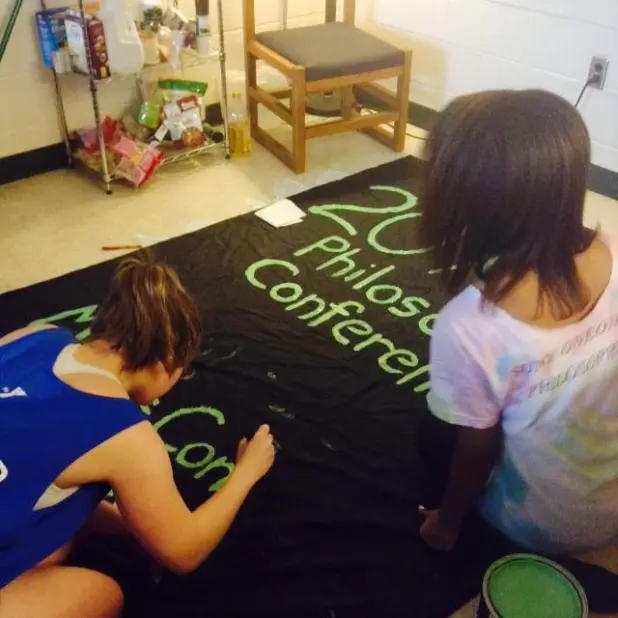
Check it out!
With only a few days left the committee is still working hard. Heres a few of us making the banner!
Calling all philosophers!
Meet the Committee!
Call For Papers 2015 Extended!
2015 Call for Papers!
Why should you come to the philosophy conference?!
2014 Keynote Speakers
We are delighted to host Taine Duncan and Douglas Lackey as this years UPC keynote speakers. Both scholars come from very diverse backgrounds and fields and will present to us their work over the course of the conference.
Taine Duncan
“Remembrances: Cultural Memory as a Form of Resistance.”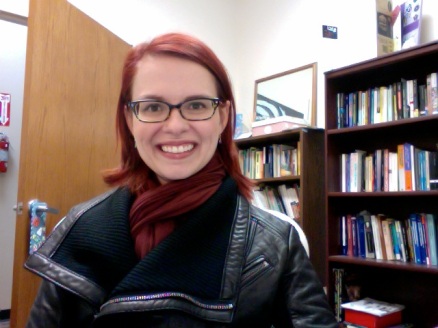
Abstract:Integral to Walter Benjamin’s Arcades Project is the careful analysis of a bygone age. Rather than analyzing his personal experiences in Paris, the central location of Benjamin’s own exile, Benjamin offers an exposé of the culture and space of 19th century Paris. Why Paris of the 19th Century? Why not use his personal experiences as fodder for his magnum opus of aesthetic theory? Perhaps even more curiously, Benjamin creates a collage of poetry, art, and commentary as though they were his own memories and thoughts on the Parisian experience. In this paper, I provide a possible explanation for Benjamin’s curious treatment of history, culture and memory. Through an analysis of Benjamin’s article “A Berlin Chronicle” alongside his Arcades Project, I argue that Benjamin’s distancing from personal experience in the Arcades Project is not only deliberate, but the only option available to Benjamin in the critical technique of aesthetic remembrance. Then, I will offer evidence for a Benjaminian project in contemporary literature via Mary Gaitskill’s Veronica. Whereas Benjamin must account for a cultural memory that informs a personal response to capitalism, Mary Gaitskill turns this formulation on its head by providing a universal account of contemporary culture through the personal memory of her protagonist. Finally, I will offer a possible synthesis of both approaches using Frantz Fanon’s autobiographical approach to explaining the bodily effects of racism. The act of remembering, whether personal, historical, or both, provides a bridge between the personal and the universal, the individual and socio-cultural. This bridge offers the possibility for understanding philosophical cultural criticism in a new light.
Douglas Lackey
Professor and Chair at Baruch College, NYC
“Mitosis and Abortion”

Abstract: Various thought experiments are proposed leading to the conclusion that it is possible for two separate persons, X and Y, to share a common past, that is, for the same events to make up their shared past history. On the same grounds, it is possible for two separate persons to share a common future, that is, for that the same events to make up their shared future. X and Y might even share a common past and a common future, sharing a past, fissioning into two, and then fusing together at some later moment in time to share a future.
Let us call entities that share pasts and/or futures “superentities,” because they have stretches of shared superimposed histories. If such entities are possible, then the entity that is a first a human zygote, then a blastocyst, and then an embryo, is a superentity, fissioning after the zygote stage and then fusing after the blastocyst stage. Every human being is thus a superentity, the history of which begins at conception.
But there are in fact no such superentities. The postulate of superentities violates the metaphysical postulate that each entity exists wholly at each point in its history. There cannot be entities X and Y that were both Z in the past: either X is wholly Z or Y is wholly Z. The metaphysical argument against superentities is stronger than the arguments given on their behalf.
Call For Papers
We are now calling for papers for the SUNY Oneonta 19th annual Philosophy Conference.
Any undergraduate student may submit a paper on any philosophical topic. The papers should be about 10-15 pages in length. If your paper is accepted, you will be invited to the conference to present and discuss your paper and participate in our full conference. The presentations should last about 20 minutes. We honor several topics and papers with awards. You can find the submission guidelines and cover page information in the menus on the left.
Submissions due by Sunday February 9th, 2014 to Oneontaphilconference@gmail.com
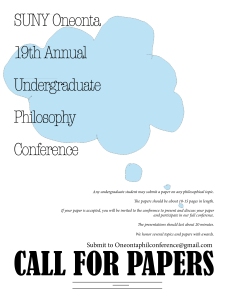
Good luck!
CONFERENCE TO BE HELD AT MORRIS CONFERENCE CENTER
Take a right turn off of West Street and onto Ravine Parkway. Once on campus, then take the second right-hand turn across from the circle building, and drive straight through the large parking lot towards the four-columned building – this Morris Conference Center.
Undergraduate Philosophy Conference Program
In the Morris Conference Center, SUNY Oneonta.
Thursday, April 11
7-9pm: Reception
Friday, April 12
8-9am: Breakfast
9-10:30am: SESSION I
IA: Corporate Markets: Morris 130
Session Chair: Douglas Goldberg
Presenter: Kelsey Smith, College of the Holy Cross; “Corporation’s Fulfillment of Conditions of Personhood”
Discussant: Robert Tracey
Presenter: Kim, Kung Min, Pennsylvania State University; “Problems of Market Values Placed in the U.S. Education”
Discussant: Gregory Talamini
IB: Ayering with Freud: Craven Lounge
Session Chair: Daniel Dillman
Presenter: Shipman, Chad, Hartwick College; “A Critique of Ayer: Verifying Religious Propositions”
Discussant: Matthew McLain
Presenter: Vega, Katrina, Ithaca College; “An Examination of the Conclusiveness of Freud’s Critique of Religion and its Relation to the Psychoanalytic Theory”
Discussant: Michael Lindquist
10:45-12:45pm: SESSION II
IIA: Becoming Free: Morris 130
Session Chair: Lynn Golan
Presenter: Mosa, Alexander, University of Toronto; “On Determined Indeterminacy”
Discussant: Kelsey Smith
Presenter: Annunziata, Anthony, Elmira College; “An Ethics of Becoming”
Discussant: Meaghan Haugaard
IIB: Wonderful Horror: Craven Lounge
Session Chair: Emily Knapp
Presenter: Gleim, Joshua, Penn State University; “I Want to Live Again”
Discussant: Matthew McLain
Presenter: McLain, Matthew, College at Oneonta; “An Analysis of Noel Carroll’s Paradox of Horror: A Neo-Analytic Interpretation”
Discussant: Joshua Gleim
12:45-2:00pm: Lunch
2-3:30pm: SESSION III
IIIA: Skeptech: Morris 130
Session Chair: Matthew McLain
Presenter: Braunscheidel, Zachariah, SUNY Fredonia; “The Skeptics of Science”
Discussant: Devin Williamson
Presenter: Lodato, Michael, College of the Holy Cross; “Attitudes Towards Technology in Heidegger and Dewey”
Discussant: Stephen Allard
IIIB: Miraculous Design: Craven Lounge
Session Chair: Aaron Segal
Presenter: Siden, Rachel, University of Massachusetts Amherst; “Science and Miracles”
Discussant: Michael Lodato
Presenter: McCarthy, Jillian; “Hume’s Critique of the Argument from Design in the Dialogues”
Discussant: Douglas Goldburg
3:30-4:00pm: Break
4:00pm-6: SESSION IV
IVA: Post-Traumatic Philosophy: Craven Lounge
Session Chair: Michael Lindquist
Presenter: Johnson, Lindsey, RIT; “A Poem After Aushwitz”
Discussant: Daniel Dillman
Presenter: McGinn, Mark, Webster University; “Instrumentalism and Poetic Thinking”
Discussant:
Presenter: Watson, John, University of Hawai’i at Manoa (David Hall Prize); “Forgiveness in Action is Lovely”
Discussant: Chelsea Cleary
IVB: Serious Phish: Morris 130
Session Chair: Antoinette Astuto
Presenter: Segal, Aaron; “Knowing that One Knows”
Discussant: Dominique Petit-Frere
Presenter: Ziff, Joseph, Haverford College; “Reconfiguring the Realm of Law”
Discussant: Aaron Segal
Presenter: Marrone, Stephan, University of Chicago; “Losing the Forest for the Trees”
Discussant: Christopher Teter
6-7:30pm: Dinner
7:30-9pm: Keynote: Carol Adams, Independent Scholar
9-11pm: President’s Reception
Saturday, April 13
8-9am: Breakfast
9:00-10:30am: SESSION V
VA: NC-17: Craven Lounge
Session Chair: Devin Williamson
Presenter: Ueberroth, Jordan, Michigan State University; “Possible Parthood and Modal-Mereological Composition”
Discussant: Johnson, August
Presenter: Johnson, August, SUNY College, Oneonta; “Epistemic Dimensions and Direct Reference”
Discussant:
VB: Aristotle’s Slavery: Morris 130
Session Chair: Greg Talamini
Presenter: Hardy, Shaun, Belmont University; “Aristotle’s Slavery and Slavery in the Modern World”
Discussant: Tim Clark
Presenter: Jennings, Emily; “The Gentleman is Not a Vassal: Confucius, Aristotle, and the Ruler Exemplar”
Discussant: Andrew Gelb
10:45-12:15pm: SESSION VI
VIA: Confucius, Taoism and Ethics: Morris 130
Session Chair: August Johnson
Presenter: Arias, Laura, SUNY Oneonta; “Taoist Thought, Confucian Ideals”
Discussant: Keegan Nicholas
Presenter: Nichols, Keegan, Lehigh University; “A Bridge Between Two Worlds: The Tao of Immanuel Kant”
Discussant: Chelsea Cleary
VIB: Playing with Graffiti: Craven Lounge
Session Chair: Lynn Golan
Presenter: Hassan, Caitlin, West Virginia University; “Graffiti: Defacement of Property or the Revival of Art?”
Discussant: Lindsey Johnson
Presenter: Sblendorio, Andrew, SUNY Fredonia; “When You Play, You Have To Mean It”
Discussant: Emily Jennings
12:15-12:45pm: Break
12:45-2:45pm: SESSION VII
VIIA: Bodies in Space: Craven Lounge
Session Chair: Chelsea Cleary
Presenter: Griffey, Allison, Belmont University; “Al Ghazzali’s Treatment of the Body in The Alchemy of Happiness”
Discussant: Lynn Golan
Presenter: Meimaris, Alkiviades, SUNY Purchase; “Enclosed Spaces”
Discussant: Laura Arias
Presenter: Demopoulos, Monique, SUNY New Paltz; “The Meaning (or Lack Thereof) of Love”
Discussant: Matthew Williams
2:45-4:15pm: Provost’s Banquet
Here’s what you need to know about the conference…
1.Discussing a paper
Your role as discussant is to lead the questioning and commenting after a presentation is over. It is your duty to spark an intriguing and intelligent discussion that not only suffices in answering any unanswered questions but also takes the presentation to a further level of insight and reflection.
Check out the “guidelines” tab for more information about discussants.
2. There will be an informal discussion session with Carol Adams in Thursday at 5pm in the Morris Conference Center. This is open to all so come by to take part in stimulating discussion!
3. Dress code
We hope you will take this opportunity to get a little dressy. Doesn’t have to be anything crazy, but lets give this formal conference the integrity it deserves.
One week til conference!!
I hope everyone is as excited as we are!
About the conference
Call For Papers
SUBMISSIONS:
➢ Undergraduate students are invited to submit papers about any philosophical topic or period.
➢ 10-15 pages in length (20 minute presentation)
➢ Submissions due by February 8th, 2013
CONTACT:
Dr. Michael Koch: faculty (Michael.Koch@oneonta.edu)
Matthew McLain: student chair (mclamj69@oneonta.edu)
To submit a paper, please send the file to this email address:
Oneontaphilconference@gmail.com
Carol Adams is coming to SUCO!
I am happy to announce that Carol J. Adams will be a keynote speaker at this years Philosophy Conference. She is the author of the pro-feminist vegetarian critical theory book The Sexual Politics of Meat and a well known activist for the rights of animals, women and men alike. SUNY Oneonta and the SUCO Philosophy Conference is happy to invite her onto our campus and into our movement for human and animal rights. 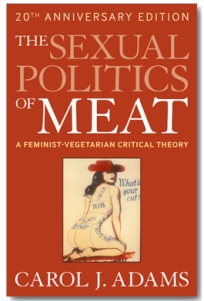 For more information please visit Carol Adam’s website
For more information please visit Carol Adam’s website
Photos from the 2012 Philosophy Conference
Credit for Photos to: Daniel Linek & Fatima Petersen

